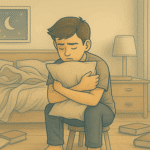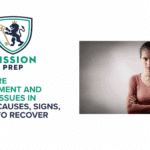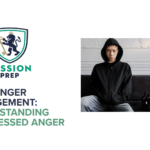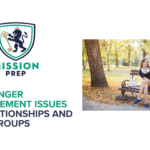Teens and Anger Management Issues at Home

Raising a teenager is no easy task. It’s normal for the teenage years to be defined by sullen moodiness and emotional flare ups, leaving parents confused and exhausted.
But if you can believe it (and I’m sure you can!), it’s sometimes even more challenging dealing with an adolescent who’s filled with anger. For a teen with anger management issues at home, irritability can quickly turn into yelling, slamming doors, punching walls, and even destroying your house.
It’s important to address teen anger at home and the symptoms of teen anger issues, as underneath teen anger is a child in need of support. The good news is that there are many treatment options available for teens who have home-related anger management issues.
Below, we’ll explore everything you need to know on this issue, as well as what to do about it.

Key Takeaways
- Teens and anger at home is often a reflection of developmental stress, emotional overwhelm, or difficulty expressing needs—not just behavior problems.
- A calm home environment with consistent routines and structure can reduce triggers that lead to anger in teens.
- Communication strategies—like active listening, calm tone, and emotional validation—help defuse tension and strengthen connection.
- At-home anger tools include pause signals, journaling, physical movement, and structured reflection to prevent escalation.
- When anger becomes frequent, aggressive, or harmful, professional help can provide targeted therapy and family support.
Table of Contents
Addressing Teen Anger at Home
It’s normal for teenagers to go through periods of moodiness. Adolescence is often a tumultuous time filled with change and transition, and the stress of increased demands, responsibilities, and choices can feel overwhelming.
The teen years are also an important developmental period when adolescents want independence away from parents and begin to establish their own identity.7 There can be a number of anger triggers in teens at home, with common ones being:
- Conflicts With Parents:4 As teens begin to desire more autonomy, this frequently creates conflict with parents, especially if the teen engages in rebellious behavior.
- Sibling Rivalry:8 Some siblings compete with each other for attention from their parents. Sibling conflict can have negative long-term impacts on children’s mental health, which can follow them into adulthood.1
- Unmet Emotional Needs: It’s important for all children to feel accepted, secure, supported, and respected, and this is especially true within the home environment. If one of these emotional needs aren’t met, it can lead to difficulties with anger.
For some teens, their angry behavior goes beyond what’s considered typical or acceptable and can indicate chronic anger. Teens with chronic anger have constant and ongoing irritability, hostility towards others, and aggressive outbursts.
This can create a home environment where parents and siblings go out of their way to avoid the teen or where arguing and fighting become a constant occurrence—neither of which are pleasant!
Symptoms and Signs of Teen Anger at Home
While the symptoms and signs of teen anger may look different for each teen, there tends to be significant crossover in the emotional and behavioral signs.
Common signs include:
Emotional Symptoms of Anger in Family Dynamics
- Resentment
- Frustration
- Feeling misunderstood
- Inability to control emotions
These are all potential emotional signs of anger issues.
Behavioral Signs of Teen Anger at Home
- Emotional outbursts
- Defiance
- Aggression
- Destructive actions
These could all indicate teen anger issues at home.
Warning Signs of Anger Escalation in Family Interactions
There are also warning signs that a teenager has more serious anger issues. These red flags include:
- Physical violence, such as hitting parents, punching siblings, or getting into fights at school.
- Verbal abusiveness, such as yelling at parents, swearing at or belittling siblings, or lashing out at peers in school.
- Destructiveness, such as punching walls or destroying physical property.
- Oppositional behaviors, such as ignoring rules, not respecting boundaries, or refusing to comply with consequences.
If these warning signs appear, it’s important to seek professional help for your teen.
Causes of Home-Related Anger in Teens
While teen anger can be impacted by hormonal changes or individual temperaments, there are a number of causes of home-related anger in teens. Some of these causes include:
- Parental Pressure: Parents can add to their teen’s home-related anger by pressuring them to excel academically, have a certain physical appearance, or be involved in extracurricular activities that they may not want to be involved in.10
- Parent Discipline Style:3 Focusing on punishment for poor behavior and demanding obedience from a teen often results in angry defiance from a teenager.
- Perceived Lack of Support:2 Teens who believe that their feelings are not respected often act out with angry behaviors.
- Unresolved Family Trauma:9 Teen anger can be a trauma response, especially in families that have experienced a traumatic event such as abuse, divorce, losing a home, or the death of a parent or sibling.
Anger issues may also arise due to an underlying mental health condition. Mental health difficulties that often co-occur with anger include:
Just a quick side note—from reading the list above, it might be easy to think, “I’m to blame!” but here’s the truth: it is no one’s fault. Anger management issues tend to crop up due to a mixture of factors, not one single thing you or someone else has done.
Regardless of the cause, seeking professional help is crucial for your teen. It can not only help them to learn new strategies, but it unpick your family dynamics, so you can all live in a harmonious home environment.
Impact of Teen Anger on Family Dynamics
Teen anger management issues at home can cause tremendous waves of disruption throughout the entire family. Families may find it difficult, if not impossible, to maintain a sense of closeness and connectedness.
Parents often find it difficult to communicate with their teen without the conversation blowing up into angry arguing or yelling. This constant stress and tension frequently creates relationship difficulties between parents.
Teen anger can also cause ripples (or rather, tsunamis) between sibling relationships, and recognizing this is important. Siblings may experience anxiety, stress, or other mental health difficulties from the ongoing disruption.
If the teen’s anger is left untreated, the long-term effects on the family can be devastating. Instead of being a safe harbor, the home can become a place that family members avoid, so they don’t have to deal with the teen’s home-related anger management issues.
Benefits of Residential Treatment for Home-Related Anger
The good news is that families do not need to deal with home-related teen anger alone. The mental health professionals at Mission Prep offer data-driven mental health therapy for teenage anger issues in a residential setting to best meet the needs of teens and their families.
Residential treatment for teen anger at home is an option for adolescents who need higher levels of therapeutic support. Residential treatment provides 24-hour supervision from trained professionals, blending therapy sessions with activities that focus on behavior modification for angry teens at home. This creates a consistent and supportive routine that encourages learning and growth.
What’s more, family therapy in residential programs for angry teens integrates parents and siblings into the therapeutic process. This form of therapy focuses on resolving conflicts and building trust within a safe and structured environment while managing family dynamics in a healthy and supportive way.

Therapeutic Approaches in Residential Programs
Therapeutic approaches in Mission Prep’s residential programs integrate a variety of therapies when working with a teen with anger management issues. Common therapeutic approaches include:
This approach helps teens reshape their negative thoughts and behaviors and learn strategies for long-term change.
Behavior Modification Programs:
These support teens to learn techniques to regulate their emotions and manage their behaviors.
These programs equip parents with the skills they need to support their teen’s progress in therapy.
Sibling Conflict Resolution:
Gives families the tools they need to build positive relationships among siblings and reduce sibling conflict by teaching health conflict resolution strategies.
Strategies for Managing Teen Anger at Home
While therapeutic intervention is crucial to help an angry adolescent and their family, there are anger diffusion strategies that can be implemented at home. Strategies include:
Developing anger control techniques by not responding to your teenager’s outbursts with your own anger.
Modeling how to deal with an emotionally charged situation in a healthy way by remaining calm and responding in a thoughtful manner.
Modeling emotional regulation skills such as taking a deep breath and exhaling before responding to emotional situations.
Respecting your teenager’s feelings and empathizing with any difficult or challenging situations they may be dealing with.
Maintaining clear boundaries and consistent expectations to help build trust and promote a harmonious environment.
Early Intervention and Prevention
Early intervention for teen anger management issues at home is important to prevent long-term consequences for your family. Family-based anger issues in teens can damage relationships in the family and destroy a healthy home environment if left untreated.
Ongoing anger can develop into a serious mental health condition that lasts well into adulthood. Not only is your angry teen susceptible, but siblings and even parents can be affected due to the ongoing trauma of an angry home environment.
If you are experiencing the signs of teen anger at home, it’s time to seek help. Professional mental health support can provide the tools needed to heal the damage in the family that has resulted from a teen’s anger management issues.
Seeking Professional Help
The mental health professionals at Mission Prep offer premier treatment in resolving home-based anger issues. Mission Prep takes a family-focused approach and prioritizes the close involvement of parents and siblings.
Reach out to us by calling the Mission Prep support line for a personalized consultation with a member of our team. We are available 24/7, ready to answer any of your questions. We offer confidential support, advice, and information about our residential support for home-related anger in teens.
We will also help you complete a HIPAA-compliant form to obtain detailed coverage information from your insurance company. This form is 100% confidential, and your insurance provider will not be notified. Private pay options are also available.
Remember that you’re not alone dealing with teen anger management issues at home. Let us help you and your family heal at Mission Prep.

References
- Weir, K. (2022, March 1). Improving sibling relationships. American Psychological Association. https://www.apa.org/monitor/2022/03/feature-sibling-relationships
- Child Mind Institute. (2024, May 21). Teens and Anger.
https://childmind.org/article/teens-and-anger/ - Child Mind Institute. (2024, September 19). How to Parent a Defiant Teen. https://childmind.org/article/how-to-parent-a-defiant-teen/
- Di Giunta, L., Lunetti, C., Gliozzo, G., Rothenberg, W. A., Lansford, J. E., Eisenberg, N., Pastorelli, C., Basili, E., Fiasconaro, I., Thartori, E., Favini, A., & Virzì, A. T. (2022b). Negative Parenting, Adolescents’ emotion Regulation, Self-Efficacy in Emotion Regulation, and Psychological Adjustment. International Journal of Environmental Research and Public Health, 19(4), 2251. https://doi.org/10.3390/ijerph19042251
- Pickhardt, C. E. (2024, January 31). Parents, Adolescents, and the Management of Anger. Psychology Today.
https://www.psychologytoday.com/us/blog/surviving-your-childs-adolescence/202312/parents-adolescents-and-the-management-of-anger - National Health Service. (2023, March, 21). Teen aggression and arguments. https://www.nhs.uk/mental-health/children-and-young-adults/advice-for-parents/teen-aggression-and-arguments/
Teens and Anger at Home
FAQs
Situations where a teenager’s anger or emotional outbursts happen frequently in the home can disrupt family life and relationships. These reactions often point to deeper emotional struggles rather than simple defiance.
Supportive home environments use consistent routines, clear expectations, calm parental responses, and physical or emotional spaces where the teen can decompress when emotions run high.
Use calm, respectful tones; listen without interrupting; validate your teen’s emotions (“I understand you’re upset”); and choose low-stress times for deeper conversations. Avoid yelling or reacting harshly in the heat of the moment.
Tools include a mutually agreed-on “pause” signal, breathing or grounding exercises, using a journal to track thoughts and triggers, short bursts of physical activity, and daily check-ins to review emotional challenges.
Seek help if anger episodes are frequent, intense, or harmful—especially if they involve aggression, self-harm, or breakdowns in family communication. Mission Prep provides specialized teen anger treatment and family support. Contact us to learn more.




















